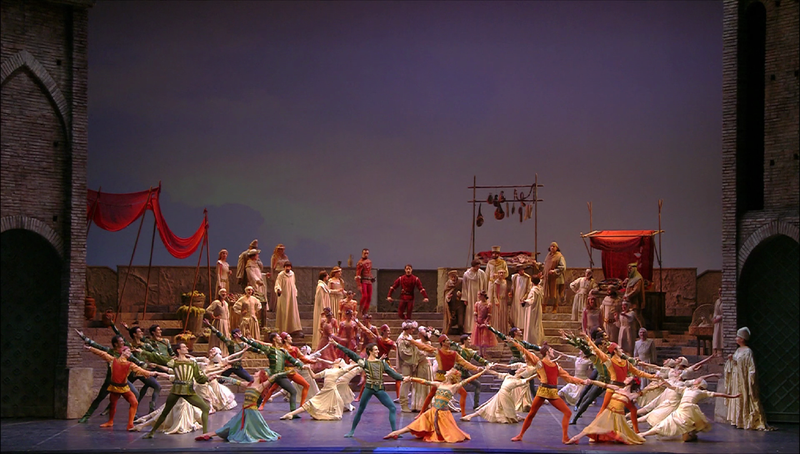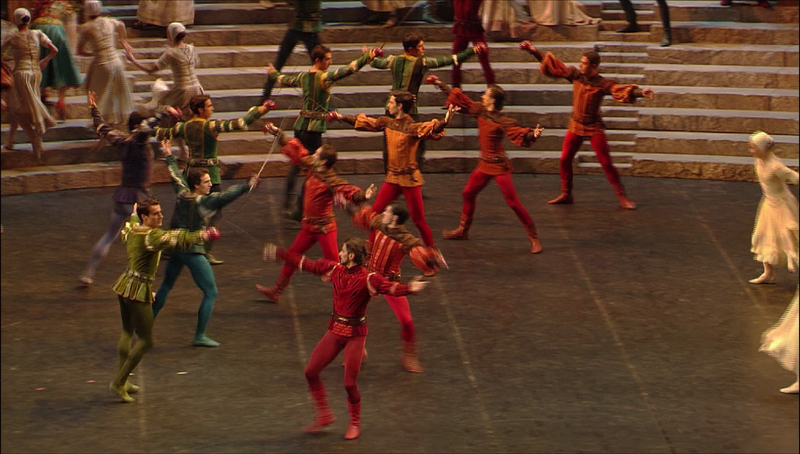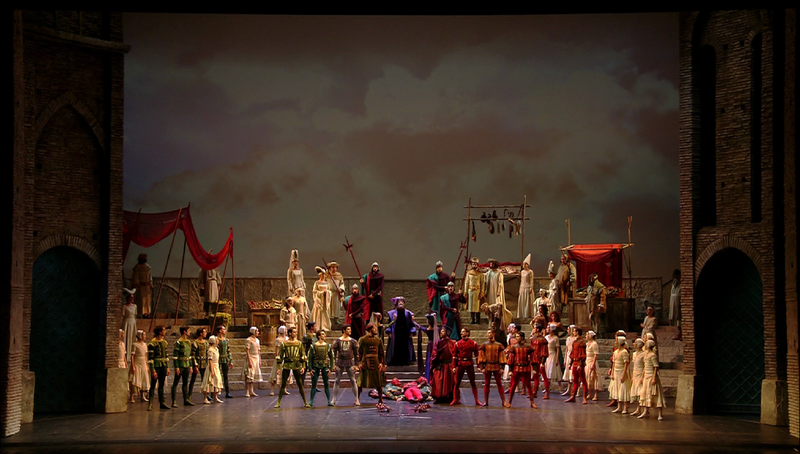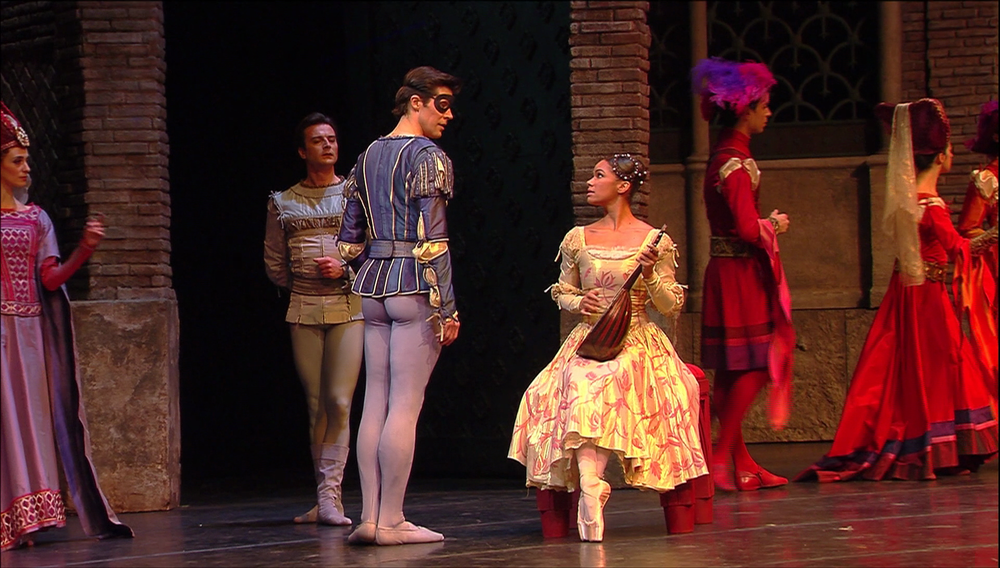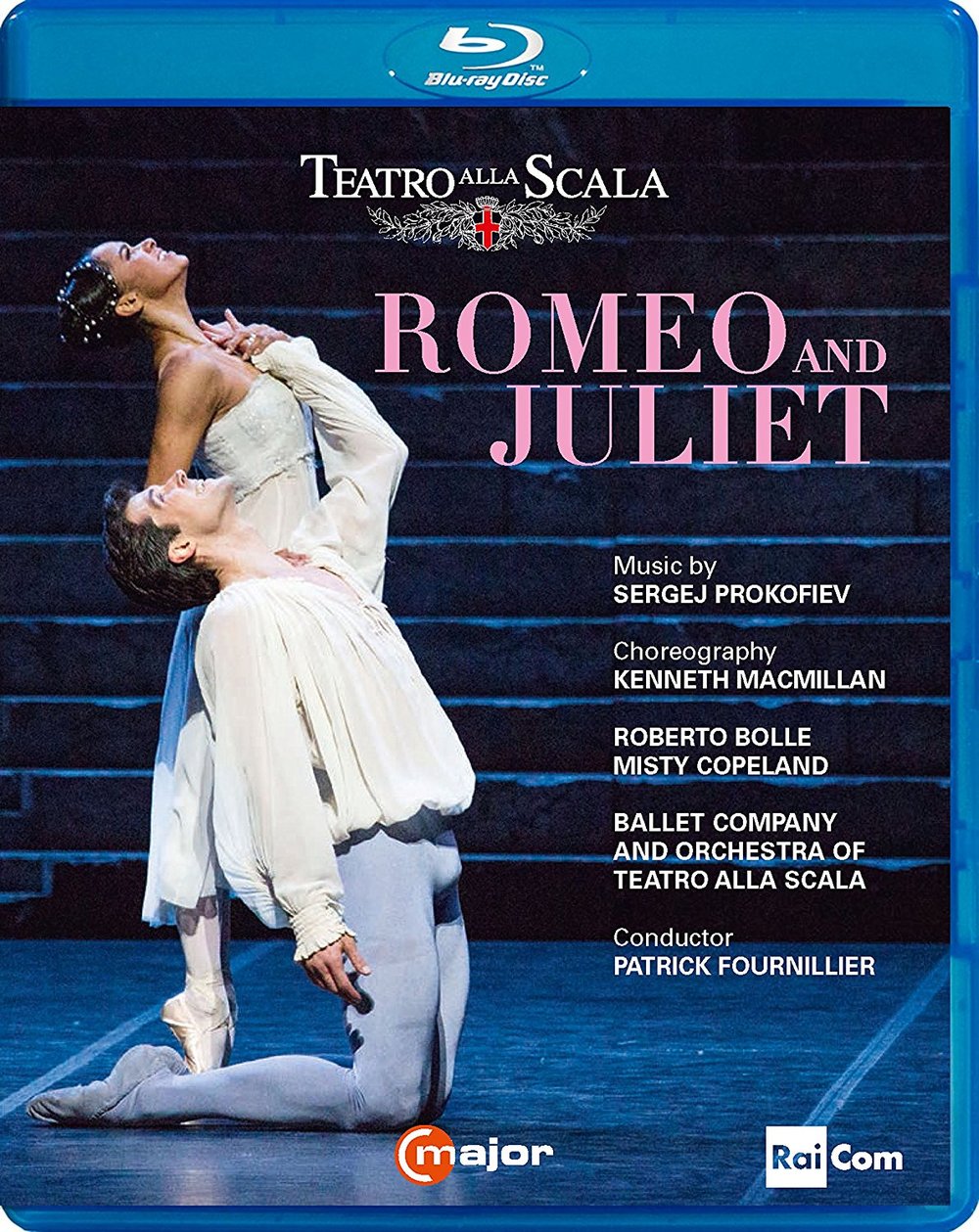
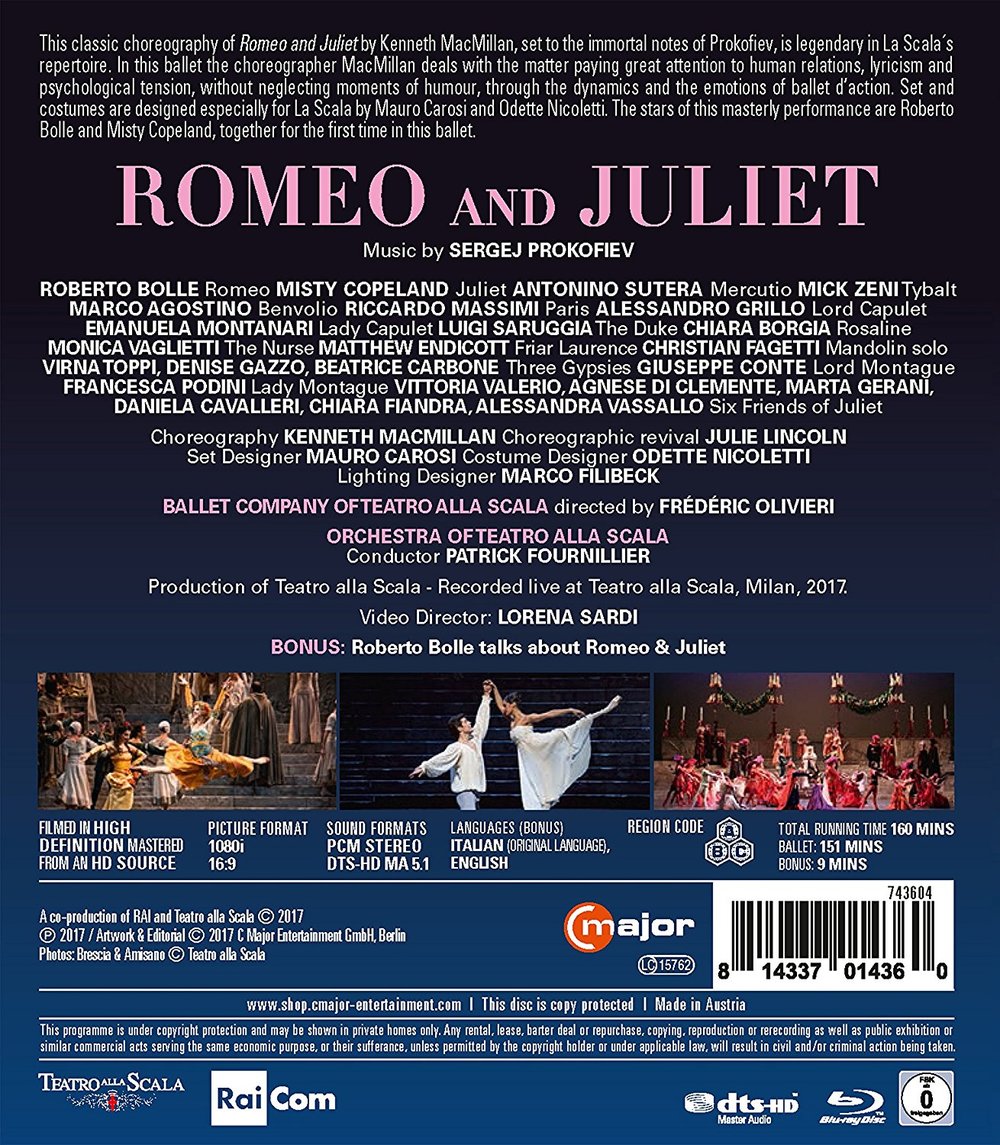
Romeo and Juliet ballet. Music by Sergei Prokofiev. Libretto by Leonid Lavrovsky and Sergei Prokofiev. Staged 2017 at the Teatro alla Scala with choreography by Kenneth MacMillan revived by Julie Lincoln. Stars Roberto Bolle (Romeo); Misty Copeland (Juliet); Antonino Sutera (Mercutio); Mick Zeni (Tybalt); Marco Agostino (Benvolio); Riccardo Massimi (Paris); Alessandro Grillo (Lord Capulet); Emanuela Montanari (Lady Capulet); Luigi Saruggia (The Duke); Chiara Borgia (Rosaline); Monica Vaglietti (Nurse); Matthew Endicott (Friar Laurence); Christian Fagetti (Mandolin solo); Virna Toppi, Denise Gazzo, and Beatrice Carbone (Three Gypsies); Giuseppe Conte (Lord Montague); Francesca Podini (Lady Montague); Vittoria Valerio, Agnese di Clemente, Marta Gerani, Danieal Cavalleri, Chiara Fiandra, and Alessandrea Vassallo (Six Friends of Juliet); and dancers from the Ballet Company of Teatro alla Scala. Patrick Fournillier conducts the Orchestra of Teatro alla Scala. Set design by Mauro Carosi; costume design by Odette Nicoletti; lighting design by Marco Filibeck. Directed for TV by Lorena Sardi; photography directed by Luciano Cricelli. Released 2017, disc has 5.1 dts-HD Master Audio sound. Grade: A+
It's old Verona, and the Montague clan (colored coded in green) is the favorite of the street people, especially the 3 Gypsy girls dressed in colorful garb. But Tybalt, a nephew to the Capulet clan, dressed in red, approaches in the background coming down the steps. He's a stuffy law-and-order type. You know the Montagues and the Capulets have been feuding for a long time, and today is no exception:
Romeo (Roberto Bolle), a younger, carefree kind of guy, is fond of cavorting with the Gypsy girls. (I think MacMillian in London called these girls “harlots” but the folks in Milan are more respectful.)
Below on the far right is a better shot of Tybalt (Mick Zeni). The aging Lord Capulet has no son, and Tybalt, blood nephew to Lady Capulet, is now de facto leader of the Capulet knights. Romeo is the Montagues' son. His best friend is Benvolio (Marco Agostino), who also wears Montague green. A more important friend of Romeo is Mercutio (Antonino Sutera). Mercutio is neither Montaque nor Capulet. He's related to the Duke, and he wears teal. He's bound to Romeo only by friendship. But the fact that he runs with the Montague men is a dire threat to the the Capulets:
Tybalt is pretty nasty—he takes out his anger on the Gypsy girls. Later when Tybalt is killed, the girls will spit on and kick his corpse!
Soon a serious fight breaks out:
The Duke (Luigi Saruggia) himself arrives to keep the peace.
A closer look at Romeo, Mercutio, and Benvolio:
The Duke seizes weapons and uses diplomacy—but nothing is going to work for long:
With no son to bear arms, Lord and Lady Capulet need to shore up the Capulet defenses. But they have a beautiful daughter, Juliet, who can be married off to a good ally. And now Paris, an older knight who is also related to the Duke, has appeared and asked for the hand of Juliet! The nurse is assigned the job of explaining to her that it's time for to put down her dolls and prepare for marriage:
The Capulets throw a grand party with Paris as special guest (Paris is dressed in white and is on your left) :
Romeo and his friends crash the party. Imagine the consternation of Paris and Tybalt when they see suddenly that Romeo is starting to flirt with Juliet!
The flirting quickly turns into mutual love at first sight. Next below is the balcony pas de deux:
Even Romeo's favorite Gypsy friend can tell the next day that something has changed Romeo:
The secret wedding. Friar Laurence hopes the marriage will lead to reconciliation between the feuding clans:
Still smarting from his crashing the party, Tybalt tries to pick a fight with Romeo. But Romeo infuriates Tybalt even more by trying to make peace:
Mercutio can't resist taking up Tybalt's challenges. While Romeo tries to stop the dueling, Tybalt takes unfair advantage and hits Mercutio with a fatal blow. You can't tell this from the ballet, of course, but here's where the dying Mercutio in the play curses both the Capulets and the Montagues with "a pox on both your houses." His curse will soon work its hurt:
Mercutio's favorite Gypsy girl is horrified at what Tybalt has done:
To avenge Mercutio, Romeo slays Tybalt, his wife's most admired cousin and the chief defender of her family:
Below the grief of Juliet's mother at the sight of the slain Tybalt:
That night Romeo enters the Capulet palace. He and Juliet consummate their marriage in her bedroom:
Romeo flees Verona under pain of death for the killing of Tybalt. Juliet, who is about 14, must decide what to do. Prokofiev's most striking and plangent chords reveal her anguish and her decision: she will follow her husband-of-one-night wherever fate leads:
Imagine the frustration of Paris when Juliet pretends to agree to marry him:
Juliet's plan (concocted by Friar Laurence) is to take a sleeping potion and feign death. Then Romeo can enter the tomb and take her away. But the Friar's clever plan will not succeed. That's enough—you know how it ends (or if not, the clip below will fill you in). Finally, if you've never read the play, I'll add that in the end the deaths of Romeo and Juliet will lead to a reconciliation between the Capulet and Montague clans. This was Friar Laurence's hope, but he did not foresee how high the price of peace would be:
Roberto Bolle, the God of Milan, is an incomparable Romeo, and Misty Copeland is a splendid Juliet. I was surprised to see how different and fresh this production is when compared to the ROB production that has been published in two different versions by Opus Arte. I can't think of anything to criticize about either this version or the 2009 ROB version as to the cast, the mise-en-scène, personal direction, music, PQ, or SQ. In both discs, the pace of the video content is too fast—I don't have to fill out Wonk Worksheets to tell you that. So I give an A+ to both this title and the 2009 ROB version. (But neither version will get a 💓 award because of the fast pace.) I admire both companies for casting a dancer-of-color star lead. I wouldn't know how to chose between the 2009 ROB recording or subject title. Get them both. Or if there must be a tie-breaker, maybe it would be Laura Morera dancing the Head Harlot in 2009 in London. I should also point out that La Scala includes 151 minutes of Prokofiev's music whereas the ROB only runs 138 minutes. Director Sardi at La Scala also includes a fair number of clips of the orchestra playing in the pit. Finally, maybe you can tell from my screenshots which title appeals to you more.
There are lots of bootleg items on YouTube, but here's the official C Major clip:
OR
